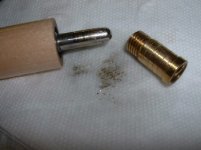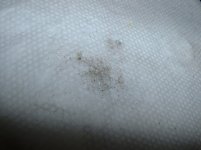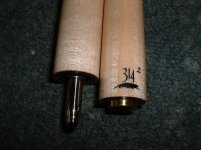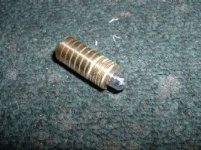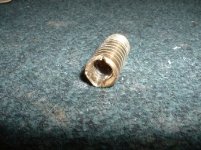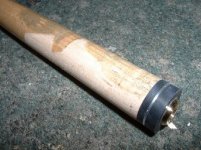You are using an out of date browser. It may not display this or other websites correctly.
You should upgrade or use an alternative browser.
You should upgrade or use an alternative browser.
Don't do this!
- Thread starter ratcues
- Start date
I mean seriously....if you have something that you make money with, or even just play around with to have fun...dont you think you would take care of it? Proper maintenence is essential in most anything in life....take care of your stuff and things like this may not happen.....kinda sux that this happened though...another reason I do not like this type of joint..I now know of 4 people that have had a joint failure with this style of joint
I do not believe this is a failure of the Uniloc system. The tolerance is tight but there is a resposibility of the player to maintain the cue. Uniloc has also made a slight change in the design and I haven't seen this as much in the the 3 years or so.
You cannot buy a Ford, run it into a tree, and then blame Ford for the damage. Personal accountability.........
You cannot buy a Ford, run it into a tree, and then blame Ford for the damage. Personal accountability.........
I think I understand what happened. The cue wouldnt come apart, possibly due to poor maintenance of the joint, so he put in in a vice, and tried to unscrew the bottom half. While unscrewing it, it left the teeth marks on the shaft. But what I dont get is the straight and sharp cut marks on the shaft with the collar. Its on the joint surface, what explains that?
ratcues said:I do not believe this is a failure of the Uniloc system. The tolerance is tight but there is a resposibility of the player to maintain the cue. Uniloc has also made a slight change in the design and I haven't seen this as much in the the 3 years or so.
You cannot buy a Ford, run it into a tree, and then blame Ford for the damage. Personal accountability.........
Is there anything that comes with the cue that tells them to take a cuetip and clean inside the insert? Or anything else to clean the insert out?
Ford, and all auto manufacturers, include a maintenance schedule and what all is involved at a particular mileage for all their cars. I've never seen this with any cue.
This type of seizure is not common in any other thread types and that is due to tolerance. An 18 or 14 thread pin/insert has about 65% contact of steel to brass so there is enough 'slop' that it desn't have the same effect. Different metals react differently. Brass on brass a wold have been worse, IMO. Steel into wood will not do this. The main problem with this type of joint is that the threads get torn from either over tightening or wood fibers drying out and becoming brittle. That can be avoided by a small amount of cue wax on the threads, maybe once a year or so.
I do not know about any other manufacturers but Predator cues come with a warranty and care card that, last time I checked, states that the insert should be cleaned with a q-tip and alcohol. This is also considered a warranty issue that could have been fixed, no charge, by sending it to me, Predator, or any other authorized repair center.
Hellfish, it looks like this customer not only clamped the cue in a vise but also grabbed it with pliers or a channel locks.
I do not know about any other manufacturers but Predator cues come with a warranty and care card that, last time I checked, states that the insert should be cleaned with a q-tip and alcohol. This is also considered a warranty issue that could have been fixed, no charge, by sending it to me, Predator, or any other authorized repair center.
Hellfish, it looks like this customer not only clamped the cue in a vise but also grabbed it with pliers or a channel locks.
ratcues said:I do not believe this is a failure of the Uniloc system. The tolerance is tight but there is a resposibility of the player to maintain the cue. Uniloc has also made a slight change in the design and I haven't seen this as much in the the 3 years or so.
You cannot buy a Ford, run it into a tree, and then blame Ford for the damage. Personal accountability.........
I agree
Personal cue maintenance is right on spot....if you want your equipment to work properly..take care of it...just dont throw it in a case and expect it to work flawlessly forever..Most cues will work..but some wont...why take a chance on a costly malfunction that may have been preventable...I for 1 for not like the uniloc joint...but that is just me...
http://predatorcues.com/predator_cues_customer_service.php
""UNI-LOC? JOINT: We recommend cleaning the Uni-Loc? Joint when you first receive your cue and every six months thereafter. These joints are precision manufactured to exact tolerances and even a modest amount of dirt can create a problem. We suggest using a Q-Tip dipped in Isopropyl alcohol to clean the inside threads and bore of the insert in the shaft. Use a clean rag and alcohol to clean the joint pin and threads as well. We recommend the use of joint protectors as they will help to keep your joint clean, and protect it from being damaged.""
""UNI-LOC? JOINT: We recommend cleaning the Uni-Loc? Joint when you first receive your cue and every six months thereafter. These joints are precision manufactured to exact tolerances and even a modest amount of dirt can create a problem. We suggest using a Q-Tip dipped in Isopropyl alcohol to clean the inside threads and bore of the insert in the shaft. Use a clean rag and alcohol to clean the joint pin and threads as well. We recommend the use of joint protectors as they will help to keep your joint clean, and protect it from being damaged.""
ratcues said:http://predatorcues.com/predator_cues_customer_service.php
""UNI-LOC? JOINT: We recommend cleaning the Uni-Loc? Joint when you first receive your cue and every six months thereafter. These joints are precision manufactured to exact tolerances and even a modest amount of dirt can create a problem. We suggest using a Q-Tip dipped in Isopropyl alcohol to clean the inside threads and bore of the insert in the shaft. Use a clean rag and alcohol to clean the joint pin and threads as well. We recommend the use of joint protectors as they will help to keep your joint clean, and protect it from being damaged.""
Great post Ratcues......along the same lines of what I was saying......proper preventive maintenance
I believe this is more critical on this type of joint...
The fix is easy, new inserts collars and finish and it's ready to play with. I thought we were here to fix anything. It's a one day job for the inserts and collars and a couple of days for finish. Charge the rate get it back to the customer and have a good day.
ratcues said:This type of seizure is not common in any other thread types and that is due to tolerance. An 18 or 14 thread pin/insert has about 65% contact of steel to brass so there is enough 'slop' that it desn't have the same effect. Different metals react differently. Brass on brass a wold have been worse, IMO. Steel into wood will not do this. The main problem with this type of joint is that the threads get torn from either over tightening or wood fibers drying out and becoming brittle. That can be avoided by a small amount of cue wax on the threads, maybe once a year or so.
I do not know about any other manufacturers but Predator cues come with a warranty and care card that, last time I checked, states that the insert should be cleaned with a q-tip and alcohol. This is also considered a warranty issue that could have been fixed, no charge, by sending it to me, Predator, or any other authorized repair center.
Hellfish, it looks like this customer not only clamped the cue in a vise but also grabbed it with pliers or a channel locks.
Ryan,
It sounds like you don't agree with me, but I'd like to elaborate on your answer. A uni-loc is going to be more susceptible because of the relatively large contacting surface area. In a threaded interface you don't have this. This failure is due in combination to the design, and the material choice. I would be willing to wager this same design, same tolerances with different materials would not have this failure. Brass on brass would not, in my opinion, succumb to this fate. Certainly any interface with wood as one of the two components would not have this fate. If any cuemaker wanting to use a uni-loc system was really concerned they could use a plating on the two components that would negate this issue. Something extremely thin like electroless nickel would do the job.
Anyway, none of you care about this since you're not going to machine new pins or coat your existing ones. The short answer is be willing to clean them or don't use them. My $0.02 for what it's worth.
-J
gulyassy said:The fix is easy, new inserts collars and finish and it's ready to play with. I thought we were here to fix anything. It's a one day job for the inserts and collars and a couple of days for finish. Charge the rate get it back to the customer and have a good day.
I thought that's what I did?
My point is that proper care and maintainance could have prevented this. I share this to educate the players so it doesn't happen to them. Its not about repairing, collecting money, ship it, and forget it....at least not for me.
Lets not forget standing behind it. I agree that proper maintenance should be available but as you know there are players that are very emotional with pool. They will continue to make our jobs interesting. God bless the butt cap slammers and the cue stick chuckers and the shaft whackers. How ever they express themselves in a game of pool is ok with me and I personally will be here for them. As far as unilock pins in my experience with them I have encountered the same exact failure. I do not care how much preventative maintenance you apply this can happen to any unilock connection. Even though it is rare it will continue to happen occasionally. I did the exact same thing when my customers shaft locked up in the insert. I destroyed the shaft out of frustration trying to get it apart. I made him a new shaft and replaced the pin.ratcues said:I thought that's what I did?
My point is that proper care and maintainance could have prevented this. I share this to educate the players so it doesn't happen to them. Its not about repairing, collecting money, ship it, and forget it....at least not for me.
gulyassy said:Lets not forget standing behind it. I agree that proper maintenance should be available but as you know there are players that are very emotional with pool. They will continue to make our jobs interesting. God bless the butt cap slammers and the cue stick chuckers and the shaft whackers. How ever they express themselves in a game of pool is ok with me and I personally will be here for them. As far as unilock pins in my experience with them I have encountered the same exact failure. I do not care how much preventative maintenance you apply this can happen to any unilock connection. Even though it is rare it will continue to happen occasionally. I did the exact same thing when my customers shaft locked up in the insert. I destroyed the shaft out of frustration trying to get it apart. I made him a new shaft and replaced the pin.
Good post! I agree that the 2 types of metal used and the extremely close tolerances this will happen sooner or later...as far as preventive maintenance..I think it will just extend the life of the joint some...but will eventually fail..
Sam Waltz said:Ahhhh the helpless cue shaft...innocent as a new born, but always blamed for failures...
Me: "My name is Sam Waltz and I'm a recovering cue abuser".
Group: "HI SAM"!
My 12 step program is going well though! We are always accepting new members. The first step is to admit you have a problem!
Please be good to your wood!
Please be good to your wood!
Isnt that the significant others job?
shamadam said:Please be good to your wood!
Isnt that the significant others job?
DATS FUNNY!:thumbup:
gulyassy said:Lets not forget standing behind it. I agree that proper maintenance should be available but as you know there are players that are very emotional with pool. They will continue to make our jobs interesting. God bless the butt cap slammers and the cue stick chuckers and the shaft whackers. How ever they express themselves in a game of pool is ok with me and I personally will be here for them. As far as unilock pins in my experience with them I have encountered the same exact failure. I do not care how much preventative maintenance you apply this can happen to any unilock connection. Even though it is rare it will continue to happen occasionally. I did the exact same thing when my customers shaft locked up in the insert. I destroyed the shaft out of frustration trying to get it apart. I made him a new shaft and replaced the pin.
